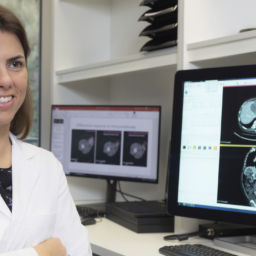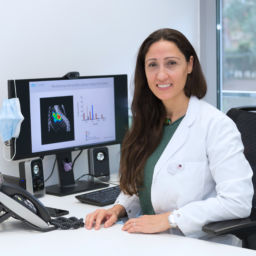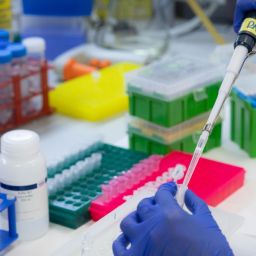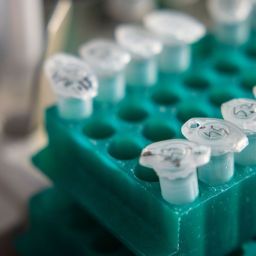
Barcelona, July 27, 2021. Recently published ahead of print in Clinical Cancer Research (1), a CCR Translations article co-authored by Elena Garralda, Director of VHIO’s Research Unit for Molecular Therapy of Cancer (UITM) – CaixaResearch (Vall d’Hebron Barcelona Hospital Campus), and Honey K. Oberoi, a phase I Investigator of her team, explores the promise of Probody therapeutics by drawing on current directions, including the results of a study (2) led by Melissa Johnson, the Sarah Cannon Research Institute/Tennessee Oncology (Nashville, USA), which published in the same issue of the journal.
More specifically, they discuss how these novel, masked antibodies could advance the development of targeted therapies based on the findings from this first-in-human phase I trial of CX-2029; a new Probody drug-conjugate (PDC) targeting transferrin receptor 1 (TfR1/CD71). Notably, the results are the first to clinically validate CD71 as a novel target for antibody drug conjugates (ADCs) in patients with advanced solid tumors.
ADCs are designed to exclusively target and destroy malignant cells while sparing healthy tissues, and therefore reduce the toxicity associated with cancer treatments. Representing a potentially powerful class of therapeutic agents in oncology, the promise of ADCs lies in their design where their attack relies on a tumor targeted antibody attached to a cytotoxic payload via a linker. Upon antigen binding, the cytotoxic load is internalized into cancer cells and leads to their death.
However, as Elena Garralda and Honey K. Oberoi go on to highlight, developing these agents is a hugely complex process, necessitating the alignment of multiple actors; target antigen selection, the antibody construct, the linker stability and the payload conjugation and potency.
“Over the last decades several hundred ADCs have entered the clinic and yet, as of April this year, only 10 have since been approved by the U.S. Food and Drug Administration; five of them only during the past two years. Furthermore, only four have been approved for treating solid tumors, exclusively targeting 3 antigens”, observed Elena Garralda, Corresponding Author of this present article and Principal Investigator of VHIO’s Early Clinical Drug Development Group.
She continued, “One major limitation to-date has been antigen selection. Unlike hematological tumors, the majority of solid tumor antigens are tumor-associated as opposed to tumor-specific. The delivery of the payload to normal tissues has therefore limited the therapeutic efficacy and value of ADCs. Broadening the array of antigens for ADCs represents an unmet need in oncology”.

The advent of Probody
To respond to this need, they explore the current landscape of Probody technology as a novel approach to more effectively outsmart cancer. By exploiting the conditions of the tumor microenvironment (TME), Probody is designed to exclusively target the tumor, while limiting activity in healthy tissues, and to take advantage of elevated levels of protease activity in the TME. The targeting-binding regions of Probody therapies are masked to reduce the side effects and toxicity associated with certain monoclonal antibodies, including immune checkpoint inhibitors (ICIs) and bispecific T cell engagers (BiTEs). Once these disguised Probody ‘deliverers’ encounter active proteases near tumor tissue, their substrates are engineered to be cleaved, removing their masks, which triggers them to bind directly to their tumor targets.
“When the Probody reaches the tumor microenvironment, tumor associated proteases cleave the linker, and the unmasking allows the antibody to bind to the target antigen and deliver powerful anti-cancer blows exclusively to cancer cells. While we are only at the initial stages of developing this new approach, we are now beginning to see promising results”, observed co-author Honey Oberoi.
Illustrative of such progress, they further discuss the study published by Johnson and colleagues (2) which represents proof of concept of this technology applied to patients, and points to value of the transmembrane glycoprotein CD71 in cancer therapy. Highly expressed in normal proliferating cells across several tumor types, CD71 binds transferrin and is key in cellular iron uptake.
“Considering CD71’s crucial role in cancer cell pathology, high expression in the membrane as well as its efficient internalization, it is an attractive target for cancer therapy. Research focused on developing antibodies targeting CD71 as anti-cancer weaponry is therefore expanding”, said Honey Oberoi.
Providing a summary of this phase I, first-in-human study of the CX-2029 Probody, Elena and Honey then highlight examples of alternative strategies that are currently under investigation to generate antibody prodrugs. These include the development of antibodies with a heterodimeric coiled-coil domain that sterically occlude the complementarity-determining regions that are also unmasked upon exposure to proteases. They also mention other current approaches aimed at seeking out novel targets for ADCs beyond the targeting of antigens expressed exclusively on the surface of tumors.
“While these areas of research are now showing promise in improving and expanding target selection as well as increasing the number of antigens for ADCs, we should consider that a good target does not necessarily guarantee success. In fact, several antiHER2 ADCs have failed in the clinic”, cautioned Elena Garralda.
“That said, with continued research aimed at optimizing the various components of ADCs, we can be optimistic that they could, in the near future, represent powerful armory against cancer”, concluded Elena, who is also participating in a VHIO-led project aimed at developing Probody, headed by VHIO’s Director, Josep Tabernero.
References:
- Oberoi HK, Garralda E. Unmasking new promises: expanding the antigen landscape for antibody drug conjugates. Clin Cancer Res. 2021 Jun 16:clincanres.1353.2021. doi: 10.1158/1078-0432.CCR-21-1353. Epub ahead of print. PMID: 34135020
- Johnson M, El-Khoueiry A, Hafez N, Lakhani N, Mamdani H, Rodon J, Sanborn RE, Garcia-Corbacho J, Boni V, Stroh M, Hannah AL, Wang S, Castro H, Spira A. Phase I, First-in-Human Study of the Probody Therapeutic CX-2029 in Adults with Advanced Solid Tumor Malignancies. Clin Cancer Res. 2021 Jun 3. doi: 10.1158/1078-0432.CCR-21-0194. Epub ahead of print. PMID: 34083236.






















